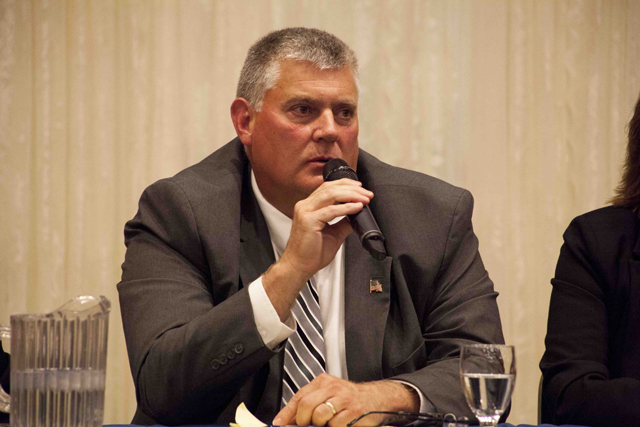Riverhead Town Board candidates square off at News-Review debate


What do you see as the town’s role in improving water quality in the Peconic Estuary region?
Tim Hubbard: “A lot has to be done with stormwater runoff and drain runoff … The use of nitrogen in fertilizers on everybody’s lawn for everybody living near the Peconic Estuary is a big problem … The town has recently passed law that if you’re going to make an addition on your house, you have to upgrade your septic system. That’s going to be a tremendous help for the amount of nitrogen running into the river and its estuaries.”
Laura Jens-Smith: “With the recent bunker fishkill, it’s become apparent this is not an issue we can put off to the side … Most homes have cesspools, and that’s where most of the nitrogen is coming from. What we need to do is educate people. Part of that is cleaning out your cesspool every five years makes a significant difference, and I think the town needs to encourage that with a tax credit. I think all new construction should have nitrogen-reduction cesspool systems. I know the Town Board has talked about sewering all along Peconic Bay Boulevard, and that may be cost-prohibitive, but if by some miracle we were able to finance that, we need to clarify that with cesspool buildup also comes density … We need to put in safeguards that the density does not increase.”
James Wooten: “The town has made great strides in their stormwater management … We put an $18 million upgrade on [the sewer district] so that we don’t have higher nitrogen levels. We’re doing studies along the riverbanks in Aquebogue and South Jamesport … Things are getting better, but we can do a lot better now.”
Neil Krupnick: “Clearly the fishkill this summer was a wakeup call, and I do applaud the town for the steps they’ve made recently. It does come down to education and to changing behavior. 80 percent of the nitrogen is coming from peoples’ homes, so obviously we all need to take a stand and do something about this. As Laura said, we can offer some sort of tax incentive to clean out your cesspools or to upgrade the systems. And as far as the sewers go, that’s going to be pretty cost-prohibitive, so I don’t know if that’s going to happen in our lifetime. But if it does, that does not mean we can build, baby, build — it means we can take care of what we have now.”
Has the town done enough to address concerns about code enforcement? If not, what needs to be done?
Laura Jens-Smith: “I’m going to say no. I think there are a lot of issues that are overlooked. I have heard from the town that there are not enough code-enforcement officials, and I believe that code enforcement should fall under the police department because they really are the eyes and ears of the town and they’re all over the place … Clearly, over at Costco, we had the land cleared over there. They clear cut the trees over there, and there was no follow-up. Many people and businesses coming into town feel at ease ignoring the codes we have here.”
James Wooten: “Well, Costco was a tenant on that property. They didn’t own the property. So we didn’t want to punish the tenant for something the developer did. But I think we can do a lot more for code enforcement, and I think cross-training is the way to go. I’m not sure how I feel about code enforcement being under the police department — it is through the town attorney’s office. But we really need to cross-train more foot patrols to handle some of the quality-of-life codes that are out there. It comes down to dollars and cents.”
Neil Krupnick: “There definitely needs to be more coordination between code enforcement and police. When you have a deli that turns into a bar and then there’s not one, but two extreme acts of violence, you don’t want to wait for the code enforcement to step in … Clearly, it’s a coordinated effort: it’s police, it’s code enforcement and it’s the town board knowing what’s going on.”
Tim Hubbard: “Code enforcement is understaffed … When Jodi Giglio and I get elected, we have a plan to increase code enforcement. She’s going to be a full-time supervisor and she’s going to cut staff in the supervisor’s office, and with that money, we’re going to be able to hire a couple of full-time code enforcement officers to go out into the town … More importantly, we need to address the quality-of-life issues: illegal housing, multiple people living in one house, businesses that are out of control doing everything they’re not supposed to do. If we tie code enforcement in and link that with the police department, the police are working 24 hours a day. They’re at these bars and these residences at 2 or 3 a.m. Code enforcement may not be aware of what’s going on.”
Laura Jens-Smith: “I agree with you that we need more code enforcement officers, but shoulda, coulda, woulda … There’s been no resolution put forth to increase our code enforcement officers or even to stagger their shifts. I find it a little incredible that at this point now that the election is coming up, we’ll do something about it even though it hasn’t been a priority in this town and it really ought to have been.”








